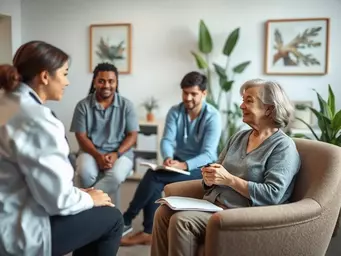Support Resources During Chemotherapy
By Dr. Elise Carter / Jan 28
What if understanding your chemotherapy treatment could significantly reduce your anxiety and uncertainty? As you learn more about the process, you empower yourself to take control of your health journey. Let's explore the vital lessons from this comprehensive overview of chemotherapy.
Navigating chemotherapy involves understanding the treatment, managing its side effects, and leveraging available support. Here are the core areas:
Chemotherapy involves powerful drugs that target cancer cells, affecting how they grow and divide. It can be administered orally or via injection, often using a combination of drugs.
Chemotherapy can cause fatigue, nausea, hair loss, and appetite changes. Nutrition and open communication are key to mitigation.
Knowledge and community support are crucial. Engage with resources, support groups, and clinical trials for better outcomes.
Maintain open dialogue with your healthcare team, track symptoms, and actively participate in your treatment decisions.
Chemotherapy can feel like a daunting aspect of cancer treatment; however, it’s essential to understand what it is and how it works. In essence, chemotherapy involves the use of powerful drugs designed to target and kill rapidly dividing cancer cells in your body. But it’s not just about attacking the bad cells; chemotherapy can affect healthy cells too, which leads to various side effects. Have you ever wondered how these treatments impact your daily life?
As a board-certified oncologist with years of experience, I’ve witnessed how knowledge can empower patients. By understanding chemotherapy, you can better prepare for the journey ahead, alleviating some of the fear and uncertainty that often accompany a cancer diagnosis.
Chemotherapy is a cornerstone of cancer treatment, but it’s important to know that it comes in different forms, each tailored to target specific types of cancer. Generally, chemotherapy works by disrupting the cancer cells’ ability to grow and divide. Here are some key points to consider:
Understanding the mechanics behind chemotherapy can help you discuss your treatment plan more effectively with your oncologist. Remember, being informed is a significant first step in managing your treatment experience.
While chemotherapy can be effective, it undeniably comes with a range of side effects that can impact your quality of life. For a comprehensive list of potential challenges and strategies for coping, the American Cancer Society provides detailed information on chemotherapy side effects. Some of the most common side effects include:
Each individual’s reaction to chemotherapy can vary widely, so it’s crucial to maintain open communication with your healthcare team. Together, we can devise strategies to mitigate these effects as much as possible.
Nausea and vomiting are among the most common side effects of chemotherapy, and they can cause a lot of distress. It’s important to know that these symptoms can often be managed effectively. The European Society for Medical Oncology (ESMO) provides clinical practice guidelines for preventing chemotherapy-induced nausea and vomiting, offering valuable insights into management strategies. Some common triggers include:
As you embark on your treatment journey, discussing potential nausea management strategies with your healthcare team can make a big difference. Whether it’s through dietary adjustments or medications, finding the right approach can help you feel more in control.
Navigating the challenges of chemotherapy can be easier with a strong focus on nutrition. Eating well during treatment not only helps with side effects but also supports your overall health. Consider incorporating the following strategies:
Remember, the right nutrition can be a powerful ally in your fight against cancer. If you have specific concerns about your diet, don’t hesitate to reach out for personalized guidance. I’m here to support you every step of the way!
What has been your biggest concern while undergoing chemotherapy? Share your thoughts below, as connecting with others can provide comfort and insights!
Facing chemotherapy can feel daunting, but remember, knowledge is power! At Types of Chemotherapy, we believe that understanding your treatment options and connecting with supportive communities can significantly enhance your experience. The journey through chemotherapy is not just about medications; it's also about finding empowerment through education and support. For more information on living with cancer, the National Cancer Institute provides a comprehensive guide on chemotherapy and you, offering valuable resources and advice.
One of the best ways to empower yourself is to actively engage with information about your treatment. Have you considered joining a support group? Connecting with others who share similar experiences can provide valuable insights and comfort. Here are some resources to explore:
As you navigate this journey, surrounding yourself with knowledgeable individuals can lead to greater confidence in your treatment decisions.
It's essential to surround yourself with a network that understands what you're going through. Finding empowerment through knowledge means digging into reliable resources and connecting with communities that share valuable insights. Have you thought about what questions you would like to ask during your treatment? Writing them down can help you feel prepared and proactive.
By immersing yourself in this information, you can turn uncertainty into understanding, making your treatment journey feel more manageable.
There are plenty of avenues to seek help beyond your immediate healthcare team. At Types of Chemotherapy, we strive to be your trusted source of information, but it’s equally important to utilize a variety of support resources.
These resources can provide not only information but also emotional support throughout your treatment. The more you seek out help, the better equipped you will be to handle the challenges that arise.
Supportive care encompasses a range of services designed to improve your quality of life during treatment. This can include pain management, nutritional support, and psychological assistance. Have you been proactive in discussing these options with your healthcare team?
Utilizing supportive care can enhance your overall well-being, making the chemotherapy experience more bearable. Don’t hesitate to ask your oncologist about which supportive services are available to you!
As you continue your chemotherapy journey, remember that taking charge of your treatment is essential. You have the right to feel informed and empowered every step of the way!
Effective communication with your healthcare team is vital for successful treatment outcomes. Are you comfortable expressing your concerns and preferences? Don’t hesitate to ask questions or voice your worries. Here are some tips for fostering open dialogue:
This proactive approach can help you feel more in control and informed about your care.
Taking control means being an active participant in your healthcare decisions. Have you considered keeping a journal to track your symptoms, side effects, and emotions throughout your treatment? This can help you identify patterns and communicate effectively with your healthcare team.
By staying organized and engaged, you’re empowering yourself to navigate your journey with confidence.
Clinical trials can offer access to cutting-edge treatments and therapies that may not yet be widely available. Have you thought about whether participating in a clinical trial might be a good option for you? It can be a way to contribute to cancer research while possibly benefiting your own treatment.
Being informed about clinical trials can open new doors for treatment and provide hope during challenging times. Remember, you are not alone; resources like Types of Chemotherapy are here to support you every step of the way!
Here is a quick recap of the important points discussed in the article:



 Support Resources During Chemotherapy
Did you know that support resources can significantly ease the journey through chemotherapy? Underst
Support Resources During Chemotherapy
Did you know that support resources can significantly ease the journey through chemotherapy? Underst
 Supporting Mental Health in Chemotherapy
When you think about cancer treatment, how often do you consider the emotional toll it takes on pati
Supporting Mental Health in Chemotherapy
When you think about cancer treatment, how often do you consider the emotional toll it takes on pati
 Chemotherapy's Impact on Relationships
Have you ever considered how a cancer diagnosis can reshape the relationships around you? The emotio
Chemotherapy's Impact on Relationships
Have you ever considered how a cancer diagnosis can reshape the relationships around you? The emotio